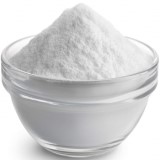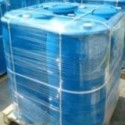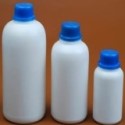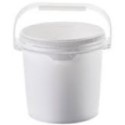 |
Magnesium Aspartate Dihydrate Anhydrous BP Ph Eur Grade Supplier Exporter Manufacturers' Representative |
Email: info@ammol.org |
Call Toll Free +1-855-552-6665 |
Magnesium Aspartate Dihydrate Anhydrous
CAS Number: 72231-13-1
Molecular Formula: C8H12MgN2O8-2H2O
Molecular Weight: 324.5

Magnesium Aspartate Dihydrate Anhydrous
Magnesium Aspartate Dihydrate Anhydrous is not found in USP Monograph.
Magnesium Aspartate BP Ph Eur Grade Specifications
Ph Eur
C8H12MgN2O8-2H2O -- 324.5 -- CAS 72231-13-1
DEFINITION
Magnesium aspartate dihydrate contains not less than 98.0 per cent and not more than the equivalent of 102.0 per cent of magnesium di[(S)-2-aminohydrogenobutane-1,4-ioate], calculated with reference to the anhydrous substance.
CHARACTERS
A white or almost white, crystalline powder or colourless crystals, freely soluble in water.
IDENTIFICATION
A. It complies with the test for specific optical rotation (see Tests).
B. Examine the chromatograms obtained in the test for ninhydrin-positive substances. The principal spot in the chromatogram obtained with test solution (b) is similar in position, colour and size to the principal spot in the chromatogram obtained with reference solution (a).
C. Ignite about 15 mg until a white residue is obtained. Dissolve the residue in 1 ml of dilute hydrochloric acid, neutralise to red litmus paper by the addition of dilute sodium hydroxide solution and filter if necessary. The solution gives the reaction of magnesium.
TESTS
Solution S: Dissolve 2.5 g in carbon dioxide-free water R prepared from distilled water and dilute to 100 ml with the same solvent.
Appearance of solution: Solution S is clear and colourless.
pH: The pH of solution S is 6.0 to 8.0.
Specific optical rotation: Dissolve 0.50 g in a 515 g/l solution of hydrochloric acid and dilute to 25.0 ml with the same acid. The specific optical rotation is + 20.5 to + 23.0, calculated with reference to the anhydrous substance.
Ninhydrin-positive substances: Examine by thin-layer chromatography, using a TLC silica gel plate.
Test solution (a): Dissolve 0.10 g of the substance to be examined in water and dilute to 10 ml with the same solvent.
Test solution (b): Dilute 1 ml of test solution (a) to 50 ml with water. Reference solution Dissolve 10 mg of magnesium aspartate dihydrate CRS in water and dilute to 50 ml with the same solvent.
Reference solution (b): Dilute 5 ml of test solution (b) to 20 ml with water.
Reference solution (c): Dissolve 10 mg of magnesium aspartate dihydrate CRS and 10 mg of glutamic acid CRS in 2 ml of water and dilute to 25 ml with the same solvent. Apply to the plate 5 μl of each solution. Allow the plate to dry in air. Develop over a path of 15 cm using a mixture of 20 volumes of glacial acetic acid, 20 volumes of water and 60 volumes of butanol. Allow the plate to dry in air and spray with ninhydrin solution. Heat at 100C to 105C for 15 min. Any spot in the chromatogram obtained with test solution (a), apart from the principal spot, is not more intense than the spot in the chromatogram obtained with reference solution (b) (0.5 per cent). The test is not valid unless the chromatogram obtained with reference solution (c) shows two clearly separated principal spots.
Chlorides: Dilute 10 ml of solution S to 15 ml with water R. The solution complies with the limit test for chlorides (200 ppm).
Sulphates: Dilute 12 ml of solution S to 15 ml with distilled water R. The solution complies with the limit test for sulphates (500 ppm). Carry out the evaluation of the test after 30 min.
Ammonium: 50 mg complies with limit test B for ammonium (200 ppm). Prepare the standard using 0.1 ml of ammonium standard solution (100 ppm NH4).
Iron: In a separating funnel, dissolve 0.20 g in 10 ml of dilute hydrochloric acid. Shake with three quantities, each of 10 ml, of methyl isobutyl ketone, shaking for 3 min each time. To the combined organic layers add 10 ml of water and shake for 3 min. The aqueous layer complies with the limit test for iron (50 ppm).
Heavy metals: Dissolve 2.0 g with gentle heating in 20 ml of water. 12 ml of the solution complies with limit test A for heavy metals (10 ppm). Prepare the standard using lead standard solution (1 ppm Pb).
Water: 10.0 per cent to 14.0 per cent, determined on 0.100 g by the semi-micro determination of water. Dissolve the substance in 10 ml of formamide at 50C protected from moisture, add 10 ml of anhydrous methanol and allow to cool. Carry out a blank determination.
Please visit SDS Safety Data Sheet of Magnesium Aspartate Dihydrate Anhydrous Suppliers.
American Molecules, also known as ammol.org is a distributor, supplier and manufacturers' representative of all types of Pharmaceuticals, Functional Ingredients, Excipients and Specialty Chemicals in Texas USA. Our principals manufacture supply and export USP NF BP, Ph Eur, etc grades of chemicals pure and reagent grade, mineral fortifiers, FCC food grade. Tailor made particle size and customized specifications are offered. The principal's facility is having one or more of the certifications like FDA approval and GLP, cGMP, ISO9001, ISO14001, ISO/IEC 17025, ISO22000, FSSC 22000, ISO45001, FSSAI, Kosher, HALAL, COPP, WHO-GMP certified and Written Confirmation (WC) for export to Europe is available. The manufacturers suppliers and exporters observe WHO Good Manufacturing Practices and Good Laboratory Practices.





Suppliers and Manufacturers' Representative:

9910 Bent Oak Dr
Houston, TX 77040, USA
Call Toll Free: 1-855-55-AMMOL 1-855-552-6665
Email: info@ammol.org